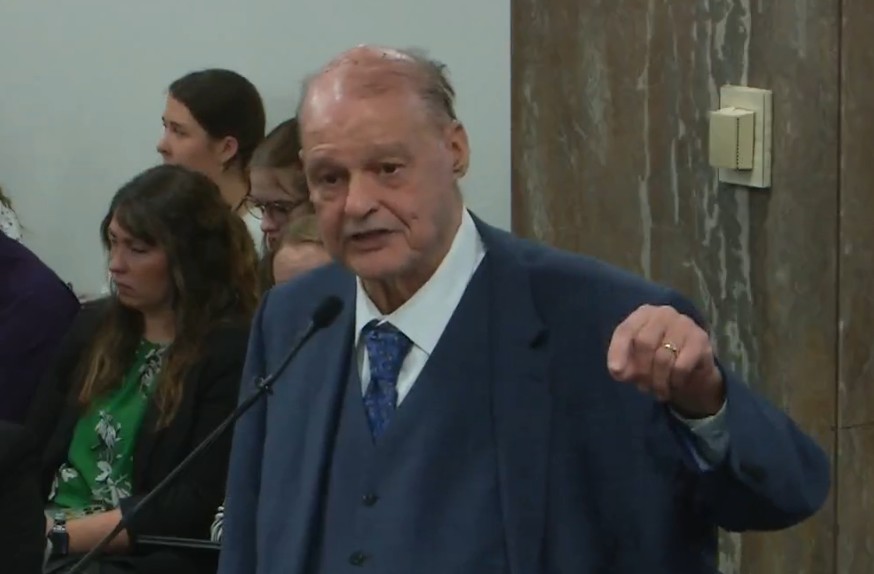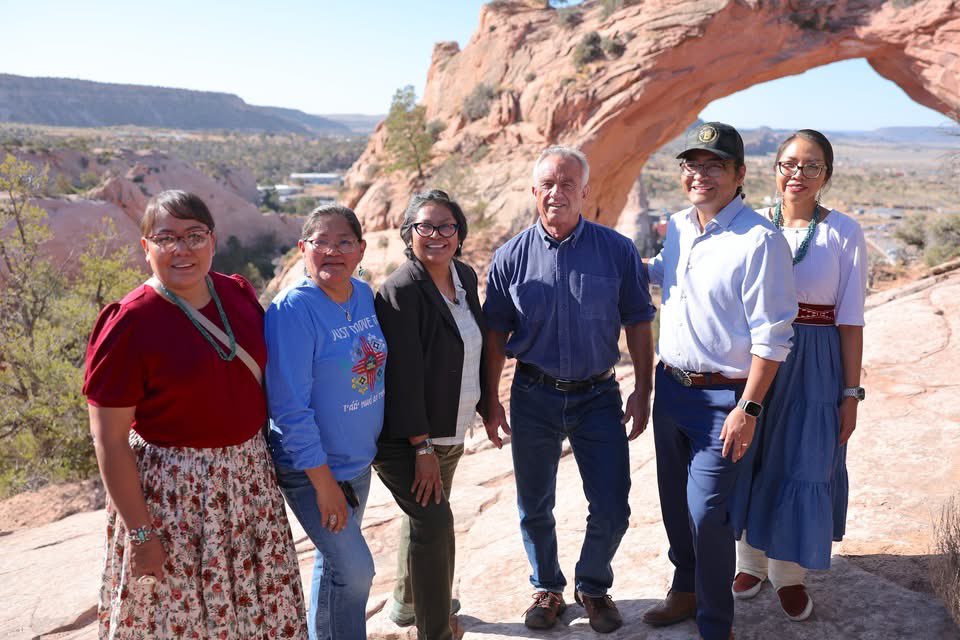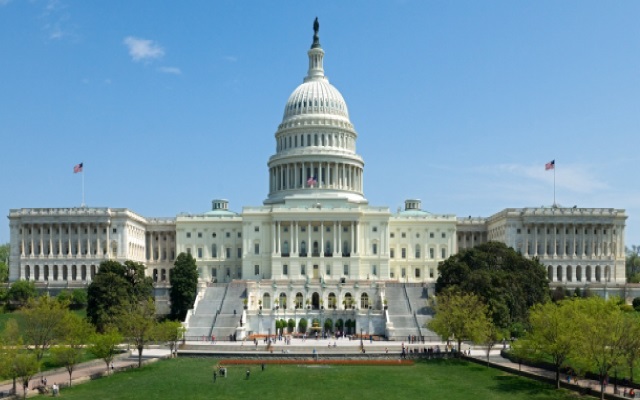
by Jonathan Eberle | Apr 15, 2025 | News
By Jonathan Eberle |
Last week, Arizona lawmakers passed SB 1164, also known as the “AZ ICE Act.” The bill, sponsored by Senate President Warren Petersen (R-LD14), seeks to strengthen cooperation between local and federal authorities on immigration enforcement. It now awaits consideration by Governor Katie Hobbs.
The legislation, which passed the Arizona House along party lines with full Republican support, prohibits state and local government entities from enacting policies that restrict cooperation with federal immigration authorities. It also establishes a process for enforcing compliance: if a city or county is suspected of violating the law, a complaint may be filed with the Arizona Attorney General, triggering an investigation under Arizona Revised Statutes §41-194.01—commonly referred to as a “1487 investigation.” Jurisdictions found in violation could have state-shared revenues withheld until they comply.
“I applaud my colleagues… for supporting this vital action to help safeguard our communities from dangerous criminal illegal aliens,” said Petersen. “It’s time for the Governor to put politics aside… and protect innocent men, women, and children.”
The AZ ICE Act prohibits state and local government agencies from blocking cooperation with federal immigration enforcement; authorizes the Arizona Attorney General to investigate and penalize non-compliant jurisdictions; requires county sheriffs and the Arizona Department of Corrections to honor immigration detainer requests; and it allows law enforcement agencies to enter into 287(g) agreements with the federal government, deputizing local officers to perform certain federal immigration enforcement duties.
The AZ ICE Act mirrors efforts in other states to support federal immigration enforcement amid ongoing national debates about border security and states’ roles in immigration policy. Proponents argue such measures are necessary to prevent the release of undocumented immigrants with criminal records and to ensure local cooperation with U.S. Immigration and Customs Enforcement (ICE).
The bill now heads to Governor Hobbs’ desk. If signed, the AZ ICE Act would take effect later this year. As the immigration debate continues, Arizona remains a key player in shaping the conversation on border policy, enforcement, and public safety.
Jonathan Eberle is a reporter for AZ Free News. You can send him news tips using this link.

by Matthew Holloway | Apr 15, 2025 | Education, News
By Matthew Holloway |
Arizona Superintendent of Public Instruction Tom Horne issued a stern warning to Arizona school districts late last week. The warning came after Phoenix’s Kyrene School District voted to adopt a policy that further embeds Diversity, Equity, and Inclusion (DEI) into the district’s day-to-day operations in defiance of policy guidance issued by President Donald Trump.
Horne warned, “Kyrene and any district or charter that is not taking the federal DEI guidance will lose their federal dollars. The U.S. Department of Education has been abundantly clear with its most recent guidance against the use of DEI language in schools. Federal law and the 14th amendment to the U.S. Constitution are clear that no person shall be discriminated because of race, skin color or ethnicity, and this guidance aligns completely with my philosophy. By contrast, the use of DEI programs does just the opposite and promotes racial discrimination. Schools ignore the federal guidance at their own peril. This is not an empty threat, and districts and charter schools need to treat it seriously.”
In its meeting on April 8th, the Kyrene School District voted unanimously to defy policy guidance from both the U.S. Department of Education (DOE) and the Arizona Department of Education (AZDOE). The move will cause the district to lose access to over $1.5 million in federal funding in favor of its “Staff Social Emotional Wellness Policy” in which it purports to “provide welcoming, inclusive learning environments in which every student is honored, valued, and feels a strong sense of belonging and purpose.”
Guidance from the DOE issued in February explicitly states that, “Institutions that fail to comply with federal civil rights law may, consistent with applicable law, face potential loss of federal funding.” It noted that “DEI programs, for example, frequently preference certain racial groups and teach students that certain racial groups bear unique moral burdens that others do not. Such programs stigmatize students who belong to particular racial groups based on crude racial stereotypes. Consequently, they deny students the ability to participate fully in the life of a school.”
The federal policy explains, “Although some programs may appear neutral on their face, a closer look reveals that they are, in fact, motivated by racial considerations. And race-based decision-making, no matter the form, remains impermissible.” The DOE also cited the U.S. Supreme Court’s 2023 decision in Students for Fair Admissions v. Harvard, which ruled that “[c]lassifying and assigning students based on their race” is an unlawful practice unless it satisfies a firm legal standard of ‘strict scrutiny,’ under two narrowly tailored instances:
(1) remediating specific, identified instances of past discrimination that violated the Constitution or a statute;
(2) avoiding imminent and serious risks to human safety in prisons, such as a race riot.”
The high court added, “An individual’s race may never be used against him” and “may not operate as a stereotype,” used to justify government polices.
In his remarks, Horne concluded, “The most interesting philosophical divide in our country right now is between those like me who believe in individual merit, and those who want to substitute racial entitlement. DEI is all about racial entitlement. The problem with racial entitlement is that it does nothing to promote hard work, conscientiousness, or creativity. If those advocating for it succeed in having it replace individual merit, we will become a mediocre, third world country. China will become the dominant power.”
Earlier this month, Horne signed an attestation letter to the DOE stating that “Arizona will not have anything to do with race-based programs, DEI, etc.”
Horne shared a handwritten missive to Secretary McMahon from the margins of the letter that AZDOE called “uplifting” which stated, “Sec. McMahon- Thank you for fighting for our Constitution and laws!”
Matthew Holloway is a senior reporter for AZ Free News. Follow him on X for his latest stories, or email tips to Matthew@azfreenews.com.

by Matthew Holloway | Apr 14, 2025 | News
By Matthew Holloway |
The Goldwater Institute has issued a report praising Arizona for pioneering “a freedom-based environment” for the development, testing, and deployment of autonomous vehicles or AVs.
Goldwater pointed to Executive Order 2015-09, signed by then-Governor Doug Ducey in 2015, which established a framework for development and testing requirements as the starting point for the free-market model.
The report highlighted the benefits of AVs, which for one manufacturer operated with 81% fewer airbag deployments, 78% fewer injury-causing crashes, and 62% fewer police-reported crashes than human-driven vehicles with over 20 million miles of rider-only service as of September 2024.
In a statement to AZ Free News Goldwater explained, “It’s not just about safer roads. AVs are revolutionizing mobility for elderly and disabled riders while unlocking massive economic potential. Unlike human drivers, AVs don’t get tired, distracted, or impaired—meaning fewer crashes and a more reliable transportation network.
“Yet while Arizona embraces the future, other states are slamming the brakes. Burdensome ‘driver in’ laws and city-level red tape threaten to stifle innovation and send AV companies packing. The question for policymakers is simple: regulate for yesterday, or innovate for tomorrow?”
According to the report, the 2015 EO, along with a 2018 follow-up to modernize the existing order to adapt to new technologies, were later enshrined into Arizona law by the legislature in 2021. Since the policy’s inception, 13 AV manufacturers have gained permission from state authorities to test and operate AVs in the state.
In its policy report, Goldwater argues that other states should adopt a policy similar to Arizona’s, referred to as “permissionless innovation” to “avoid erecting unnecessary regulatory barriers to AV innovation in order to reap the full benefits of this game-changing technology.” In particular, Goldwater criticized the innovation stifling single-party system in California where AV makers can wait over two years from proposal to deployment and a bill has advanced that would permit cities to create permitting requirements and restrict AVs’ hours of operations on city roads.
However, they add that other states are skewing in the opposite direction, instead applying regressive “Driver In” bills as well as municipal-level permitting regimes that lead to a Byzantine system of fragmented, inconsistent regulation.
Goldwater noted, “These efforts, driven by special interests and speculative fears, ignore the clear benefits and real-world data accumulated from years of studying AV safety.”
The think-tank observed that the experience gained in Arizona “offers a counterpoint—and a roadmap. States that follow the Arizona Model will not only attract investment and jobs, but also position themselves at the forefront of transportation’s next revolution. The choice facing lawmakers is simple: regulate for yesterday, or innovate for tomorrow. The roads of the future will see autonomous vehicles. And Arizona is already miles ahead.“
Matthew Holloway is a senior reporter for AZ Free News. Follow him on X for his latest stories, or email tips to Matthew@azfreenews.com.

by Matthew Holloway | Apr 14, 2025 | News
By Matthew Holloway |
The Navajo Nation’s Democrat President Buu Nygren met with Secretary of Health and Human Services Robert F. Kennedy Jr. and Council Delegate Germaine Simonson at Window Rock on Wednesday. The trio discussed the ongoing issue of access to critical healthcare on tribal land.
According to a press release issued via X, the meeting centered around “solutions rooted in sovereignty, tradition, and self-reliance.”
Kennedy, as part of his nationwide “Make America Healthy Again” tour, had previously met in Phoenix with members of the State legislature, and traveled to northern Arizona and the Navajo Nation to meet with tribal leaders including President Nygren, First Lady Jasmine Blackwater-Nygren, Speaker Crystalyne Curley, members of the 25th Navajo Nation Council, and officials from the Navajo Department of Health.
President Nygren noted in his remarks that much of the disparity and strain on the Navajo Nation healthcare system is linked to the Indian Health Services’ manpower shortage with the service currently running at a 30% vacancy rate.
Nygren emphasized that the solution must come in a way that protects the tribe’s sovereignty, however. “As President, I want to emphasize the importance of protecting and maintaining tribal sovereignty among food and healthcare for the Navajo Nation,” he said.
Answering these concerns, Kennedy expressed his support and provided a roadmap to addressing the tribal government’s concerns. “By lifting the IHS hiring freeze and rescinding the hundreds of employee terminations,” Secretary Kennedy said, “it will not happen.”
“Today we learned many things that HHS could be doing to improve the condition of Navajo health…” he added, with a focus on the need for secured water rights that will allow the Navajo to become self-sufficient once again.
In a post to X, Kennedy described his visit saying, “Today I had the pleasure to visit Navajo Nation in Window Rock, Arizona. I joined Navajo Nation President Buu Nygren and members of the Navajo Nation Council for a hike, followed by a traditional blessing and a performance of the Diné Tah Dancers.”
“We discussed Navajo Nation’s efforts to promote health and wellness within their community and how HHS can support these goals. My administration remains committed to making Indian Country a top priority.”
Buu, a Democrat, stressed in a statement that his recent trip to the White House and Kennedy’s trip to Window Rock represented an effort to work with the federal government in the Navajo Nation’s interests, regardless of partisan considerations.
He wrote,” I need our Navajo people to understand that no matter what our political party affiliation is, we must work with the federal administration – whoever is in office – to fight poverty on the Navajo Nation and to protect our interests. In the past two days, I have spoken to several federal officials to discuss the coal industry, our water rights settlements, RECA, the protection of the Indian Health Service, and social programs our people rely on. As a Nation, we must act like a Nation and work with the United States. We must work with the federal government based on our treaty and on a government-to-government basis.”
President Nygren was elected in 2022, defeating incumbent former-President Jonathan Nez by a narrow margin of less than six percent. The Navajo Nation leans heavily Democrat in most elections, however, 2024 exit polling suggested that support for the Trump administration has significantly increased with Native News Online citing polls showing President Trump received 51% of Native American votes in the presidential election.
Matthew Holloway is a senior reporter for AZ Free News. Follow him on X for his latest stories, or email tips to Matthew@azfreenews.com.

by Matthew Holloway | Apr 14, 2025 | News
By Matthew Holloway |
The Democratic Congressional Campaign Committee (DCCC) has made it clear that it is targeting the congressional districts of Congressmen David Schweikert (AZ-01), Eli Crane (AZ-02), and Juan Ciscomani (AZ-06) in 2026.
On Wednesday the Arizona Democratic Party said it is “focused on winning these critical seats, paving the way for a Democratic House majority in 2026.” The release referred to the three Republican Congressmen as “vulnerable,” and their districts as “competitive.”
Arizona Democratic Party Chairman Robert E. Branscomb, II claimed, “Arizonans are tired of David Schweikert, Eli Crane, Juan Ciscomani and other MAGA-cronies playing politics with the issues that impact their ability to make ends meet. As a Party, we will stop at nothing to hold them accountable and to finally elect leaders who will move Arizona forward.” However, the state of play in each district doesn’t seem to be that simple.
Schweikert and Ciscomani both won their 2024 elections with 2-3% margins with Schweikert serving as Ciscomani’s CD6 predecessor before moving to CD1 with redistricting. Each of these constituencies are competitive by their nature and by design, according to the Arizona Independent Redistricting Commission (AIRC). The 2021 commission held District 1 competitiveness at a 2.6% vote spread and District 6 at a 2.4% spread, both of which proved accurate in the 2024 race.
Historically, the area that is now District 6 has seen six Republican victories and only three for the Democrats in the in the past nine statewide elections, making District 1 truly the most “competitive” with a more even split of 5 GOP victories to 4 losses per the AIRC.
The same day the Arizona Democratic Party issued their press release, both Reps. Ciscomani and Crane held telephone town hall meetings with their constituents.
The DCCC’s calculus seems to fall short with Rep. Eli Crane’s District 2 seat though, which has seen historically zero Democrat wins in the last nine races and was designed to hold a 7.2% vote spread competitively. That spread Crane decisively beat in his 9-point victory over Democrat Jonathan Nez last year.
As AZ Free News reported in February when a Democrat SuperPAC bankrolled by leftist billionaires announced they would target his seat, Crane’s response was blunt. He wrote in a post to X, “The great thing about #AZ02 is they see through phony attacks by coastal elites. Bring it.”
Given the historic makeup of these districts: two of them designed to give Democrats a chance and a third that appears nearly unassailable, the AZDems assessment of the three Congressmen as “vulnerable,” and their districts as “more “competitive than normal” seems questionable at best.
Matthew Holloway is a senior reporter for AZ Free News. Follow him on X for his latest stories, or email tips to Matthew@azfreenews.com.





